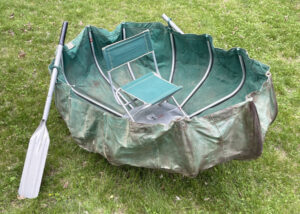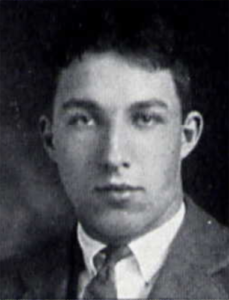True Tales from Canton’s Past: Will It Float?
By George T. ComeauThe idea came to Malcolm Stanley over time, and like many inventions, it was an iterative process. For many years Stanley had “dreamed of a lightweight fishing boat that could be strapped on a human back and easily carried through the woods.” Not only was Stanley a dreamer; he was also a “doer” and his idea would take years to come to fruition. Today, the Canton Historical Society has two of his inventions and the story of Stanley’s local company is long forgotten.
Malcolm North Stanley was born and raised in Brookline and attended Browne & Nichols. After attending Harvard University, Stanley held jobs as an insurance agent, a boatyard operator, a yacht salesman, a marine surveyor, and a salvage expert. By the 1930s he had taken a position as a merchandising manager for a Boston firm. While working to design packaging and promotional materials, Stanley found his strengths and won two national awards for packages he designed.
As World War II began, Stanley enlisted in the Navy and served from 1941 to 1946. It was during his time in the service, much of it spent on the water, that he perfected his idea for a lightweight and portable boat. In August 1949, Stanley applied for a patent: “This invention relates to fabric-covered boats of the type which may be collapsed or folded like an umbrella.” The idea was to create a watercraft that could collapse like a closed umbrella and without any assembly, open and be fully functional. Stanley had studied a variety of similar watercraft and tents, and many collapsible kayaks and fold-boats required assembly along the ribs. Stanley devised a system whereby the ribs and braces were properly proportioned “for uniform stress and durable construction … and which is economical to manufacture.”
Even before Stanley had secured his patent he had released a commercial product. Made of lightweight aluminum tubing and wrapped in canvas, the small boat, when fully open and operational, featured a small aluminum chair. That same year Stanley’s boat was featured at the Boston Boat Show and Stanley’s company took off and all looked bright. The boat was called “Packet” and sold for $98.50 — the equivalent of $937 in today’s dollars.
On June 27, 1950, the United States officially entered the Korean War. The war effort required vast amounts of aluminum and Stanley was forced to shelve his project. Over 100 of the small personal boats had been sold, and so the dream was delayed.
In 1953, Stanley redoubled his efforts and started up the company. By leveraging his patents, Stanley was able to raise some money, and when an investment banker was unable to attract individual investors, Stanley turned to family and friends. More than 131 individuals trusted in the idea and gave Stanley the capital he needed to launch his company.
Stanley called it the Porta Company, and it was located at 32 Neponset Street. The company bought a 5,000-square-foot building and a garage situated on two and a quarter acres of land on the hill above the Congregational Society church. The building had been used for various small businesses; most notably for many years it was the Mathews Steam Laundry facility. It was a perfect home for the Porta Company.
Stanley took a salary of $125 per week and began to aggressively manufacture and market the small boat. To support the product, he expanded the line to include the “Ozark Cot” and the “Ozark Tent” with camping accessories. One of the accessories was a “Privy Chair” in which the user would straddle two canvas straps over a hole in the ground and relieve themselves with more comfort than squatting over a hole.
Placing several employees on the payroll, the company brought in Oliver Hazard Perry Rodman to assist with publicity and marketing. Rodman had been the editor of Hunting and Fishing Magazine and had written seminal books on salt and freshwater fishing. Rodman was responsible for introducing striped bass surf fishing to Massachusetts. Having a deep knowledge of outdoor recreation, Rodman served as a vice president of Porta Inc. and along with others he helped place the products in national publications. In the first year of business the company sold over $4,000 worth of products. The loss that year was $22,315. Not a promising start.
What is most fascinating is Stanley’s dedication to the “science” of the business. Drawing upon his background in various jobs he held over the years, Stanley, in setting prices for the Porta line, “developed unit costs by making time studies, computing raw material costs, and allocating arbitrary percentages of estimated overhead on the basis of direct labor costs.” The boats were sold either directly or in catalogues. Without a big budget, Stanley relied upon publicity as opposed to advertising.
In 1956 Porta equipment appeared in “at least 40 magazines” and the items were exposed to millions of outdoor enthusiasts. Ford Motor Company ran pictures of the tent and boat on three separate occasions. The ad executives at Ford even featured Porta in advertisements in the Midwest to promote the purchase of station wagons. Even Alcoa Aluminum got into promoting Porta to illustrate the ways in which aluminum was used as a finished consumer product.
Stanley was incredibly enthusiastic in this venture. While sales never really took off, the line expanded. A family tent, a mountain and hunting tent, a hiking tent and all manner of cutlery and cooking equipment were all made here in Canton. Stanley was quoted as saying, “I’ve been hunting and fishing my whole life and I know these products are useful.” Stanley believed in his ideas and the company. The products were designed and suited for family campers and all of the items combined quality, lightweight modern materials, and ease of erection and comfort. That said, people just did not catch on to the ideas and products of Porta. Sadly, the company hemorrhaged money. In the first two years Porta posted a loss of nearly $48,000. With the optimism of all great entrepreneurs, Stanley was quoted as saying, “It’ll take time, but this is the way you grow a small business.” Sadly, this was not to be.
By May 1963 the Porta Company began to wind things down. The property they owned on Neponset Street was likely their largest asset and they sold it to settle debts and liens. Stanley died in 1976, and true to his calling in life, donations were made in his memory to the Sierra Club. As for the Packet, several years ago a woman reached out to the Canton Historical Society and asked if they would like two of the small, foldable boats. Wally Gibbs, then the president of the society, met up with the woman and recalls that it was a family member of the inventor. Today, we have two of the original Packets — and the only question we still have is, “Will it float?”
Short URL: https://www.thecantoncitizen.com/?p=74638












